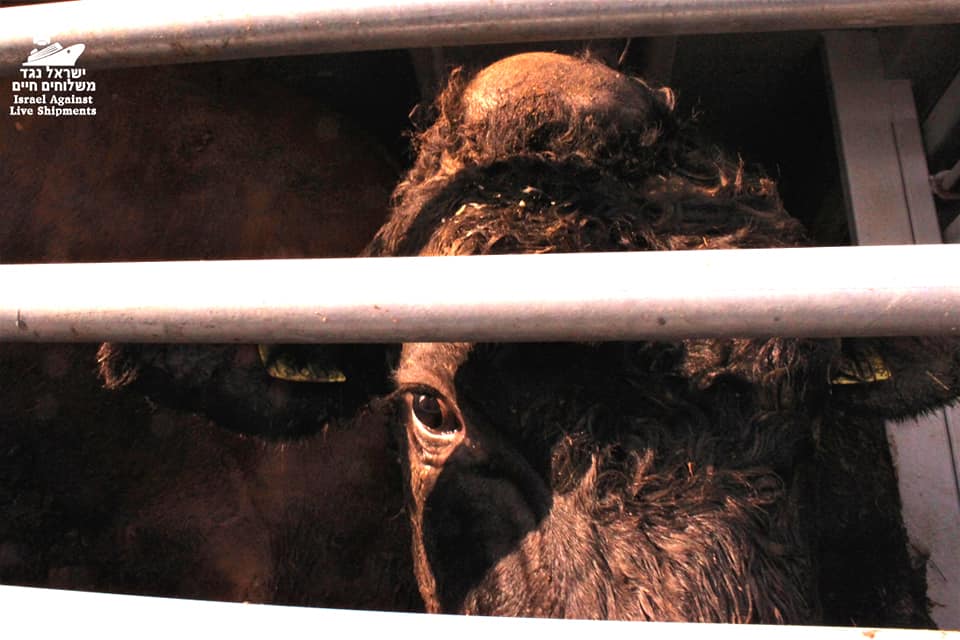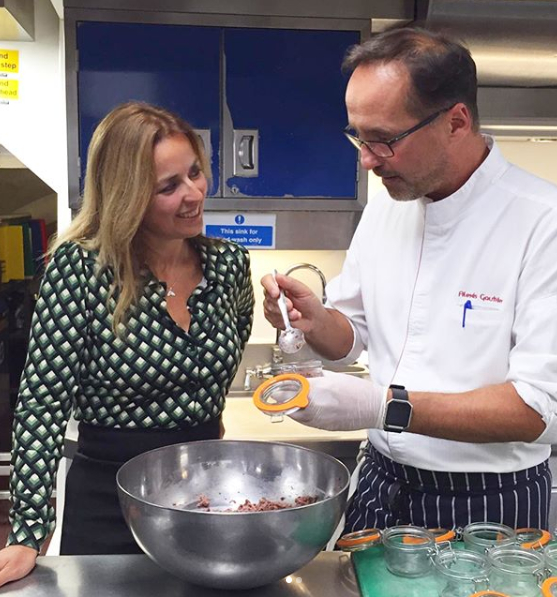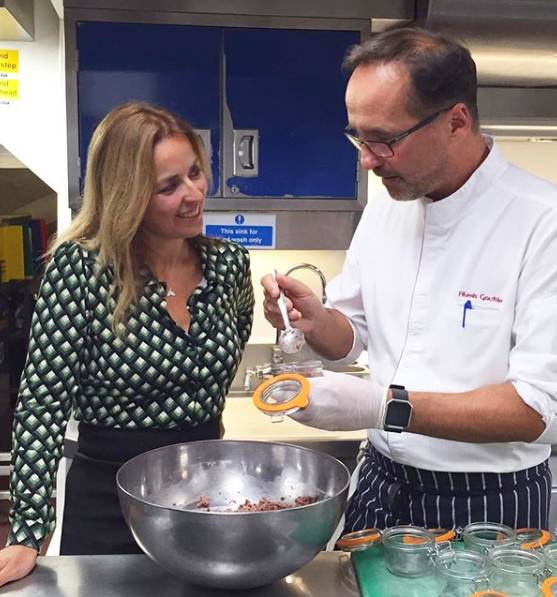Worldlog Marianne Thieme 4 septtembre 2018
The recess has finished. It was a busy recess because I am working on a new book about the importance of idealistic politics and on a new documentary together with our scientific bureau (the NGPF). I will tell you more about that later.
The fact that idealistic politics remains necessary was confirmed several times this summer. While summer often brings peace and joy for people, this summer was hell again for millions of animals. One of the most horrifying violations of animal welfare is the cruel transport of animals within and outside of Europe: animals that are transported from EU countries to countries like Turkey and Israel, travelling for days and sometimes weeks, who become overheated, dehydrated or die because they get jammed. Endless waiting times, for example at the Bulgarian-Turkish border, causes shocking and unacceptable animal suffering.

Millions of animals suffer during long transports
Approx. 23 million of day-old chicks are transported by plane from the Netherlands to other countries every year. And from Belgium even more than 100 million chicks get transported. Sometimes, the abominations that take place with that make the news, such as the twenty thousand of chicks that were found dehydrated, grilled and gassed in their transport container at the Belgian airport Zaventem. This is only the tip of the iceberg.
The Party for the Animals wants to stop such suffering of animals as soon as possible. For that reason, we have asked for attention for these unjustified actions in different ways this summer, both in the Netherlands and in Europe. We asked the responsible Dutch minister and the European Commission critical questions. Our MEP Anja Hazekamp portrayed the violations of European agreements on animal transports at the ports of Slovenia and Croatia: animals on transports die because of the heat, weak animals were forced on board with violence, there were no vets and regulations were not observed.

This summer there was a lot of animal suffering in the Netherlands too: on the 18th of July, 1,200 pigs died because of suffocation. The ventilation system was defective, the alarm did not work, and the owner tried to hide these sad circumstances. In the Netherlands, piglets are fattened mechanically for slaughter. Food, water, ventilation: everything is fully automatic and there is no human intervention at all. The air the animals have to live in is poisoned, so if the ventilation system breaks down there is nobody to rescue the animals.
Luckily, people are increasingly opposing to the way animals are treated. Residents try to block the arrival of a megastable in their vicinity more frequently. On the 25th of August, people organised the first Animal Rights March in the Netherlands and they demanded to stop the exploitation of animals. The march took place in various cities in countries such as Luxembourg, New Zealand, the Philippines and Canada.
And there are more positive developments: companies such as WeWork (6,000 employees) have stopped serving meat and many more educational institutions are changing to vegetable food. The German Minister of the Environment recently decided that vegetarian meals will be served during all official government events. The products must then preferably be organic, from the current season, local and/or fair trade. That is how it should be: the government must set the right example. That is why I have also asked the Dutch government to change to vegetable catering.

Marianne visiting vegan Michelin star chef Alexis Gauthier
And that it is simple to eat delicious vegetable food was evidenced by my visit to Alexis Gauthier, vegan and French Michelin star chef, who has his restaurant in London. His foie gras – causing much animal suffering – used to be really famous, but he never wants to make it again. Gauthier now has a vegetable version, the “faux gras”, based on lentils, walnuts and shallots. It is just so nice and so free from animal suffering.
In Gauthier’s restaurant I interviewed scientist Marco Springmann of Oxford University, who told me why it is better not to eat any animal products. The interview is for our new documentary, which will be released at the start of next year. To be continued!
Until the next time.
Marianne
Sono gia finite le ferie. Ho fatto un sacco di cose durante le ferie, poiche’ sto lavorando su un nuovo libro sull’importanza della politica idealistica ed un nuovo documentario insieme al nostro dipartimento scientifico NGPF. Vi raccontero’ di piu’ piu’ avanti.
Durante l’estate e‘ stato confermato varie volte che abbiamo tutt’ora bisogno di una politica idealistica. Mentre l’estate porta spesso tranquillita’ ed alegria per la gente, anche quest’estate e’ stato un inferno per milioni di animali. Una delle violenze piu’ piu’ crudeli del benessere degli animali e’ portare gli animali in giro dentro e fuori dall’Europa: i trasporti con animali che vengono portati dalla UE a paesi come la Turchia e l’Israle, che durano giorni o addirittura settimane. Gli animali si scaldano, soffrono di disidritazione e vengono spappollati. Tempi lunghissimi di attesa dalle frontiere ad esempio Bulgare e Turche portano ad una sofferenza per gli animali inaccettabile ed estremo.

Milioni di animali soffrono durante i lunghi trasporti
Dai Paesi Bassi vengono esportati ad altri paesi circa 23 milioni di galline nate da un giorno tramite aeroplano. Dal Belgio sono addirittura oltre 100 milioni. A volte le crudelta’ associate raggiungono il telegiornale, come le 20.000 galline nate da un giorno che sono state disidratate, grigliate e gassate nel loro container di trasporto all’aeroporto Belgo di Zaventem. Queste sono solo l’incima della montagna di giaccio.
Il Partito per gli Animali vuole che finisca il prima possibile questa sofferenza degli animali. Abbiamo quindi chiesto l’attenzione per questo problema in tanti modi anche quest’estate, sia nei Paesi Bassi che nella Unione Europea. Abbiamo fatto delle domande critiche al ministro olandese responsabile e alla Commissione Europea. La nostra europarlamentare Anja Hazekamp ha visualizzato dai porti Sloveni e Croati le violentazioni degli accordi europei relativi al trasporto degli animali: animali che muiono per il calore, animali deboli vengono forzati con brutta violenza a bordo del veicolo, mancavano dei veterinari e le regole non venivano rispettate.

La sofferenza degli animali era enorme anche nei Paesi Bassi quest’estate: il 18 luglio morivano 1200 maiali in una stalla. Il sistema di ventilazione era rotto, l’alarme non funzionava e il padrone cercava di nascondere questa triste avvenienza. Nei Paesi Bassi, i ninetti vengono inciccioniti per la macelleria tramite una macchina. Cibo, acqua, ventilazione: tutto e’ automatico e non c’entra l’uomo. L’aria dove vivono gli animali e’ velenosa, quindi quando si rompe il sistema di ventilazione non c’e’ nessuno per salvare gli animali.
Per fortuna la gente si oppone sempre di piu’ contro la maniera in cui trattiamo i nostri animali. Sempre di piu’ vengono bloccati gli arrivi di megastalle dagli inabitanti della zona. Il 25 agosto i cittadini hanno organizzato per la prima volta la Marcia Diritto Animale nei Paesi Bassi, chiedendo una fine all’abuso degli animali. La marcia teneva luogo in varie citta’ di paesi come il Lussemburgo, la Nuova Zelanda, le Filippine ed il Canada.
Esistono altri sviluppi positivi: aziende come WeWork (6000 dipedenti) smettono di servire la carne e sempre piu’ scuole cambiano verso il cibo vegetale. Il ministro per l’ambiente tedesco ha deciso recentemente che durante tutti gli incontri ufficiali del governo si mangera’ solo vegetariano. I prodotti devono essere preferibilmente biologici, della stagione e locali o fairtrade. Cosi’ deve essere: il governo deve dare il buon esempio. Per questo motivo ho chiesto anche al governo olandese di cambiare verso il catering vegetale.

Marianne va a trovare lo chef Michelin vegano Alexis Gauthier
E che possiamo mangiare bene vegano, e’ stato evidente dalla mia visita da Alexis Gauthier, vegano e chef Michelin francese con un ristorante a Londra. Una volta era famosa la sua foie gras – che porta molta sofferenza per gli animali, ma non lo vuole mai piu’ fare. Gauthier ha una versione vegetale adesso, la “faux-gras”, in base a lenticchie, noci e cipolotti. Tanto buona e anche priva di sofferenza per gli animali!
Nel ristorante di Gauthier ho fatto un’intervista allo scienziato Marco Springmann dell’Universita’ di Oxford, che spiegava perche’ e meglio non mangiare i prodotti animaleschi. L’intervista serve al nuovo documentario che esce all’inizio del prossimo anno. Ne sentirete ancora parlare!
Alla prossima volta.
Marianne